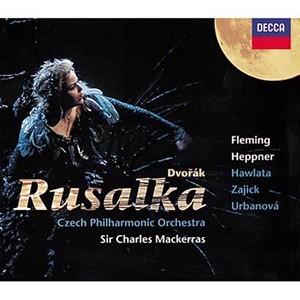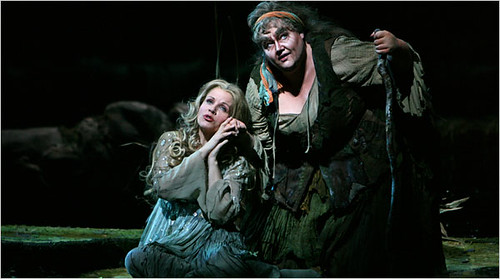Rusalka (Dvorjac), não sendo uma ópera de primeira linha, contém inúmeros encantos (além da justamente famosa Song to the Moon). Pessoalmente, a composição fascina-me pelo extremo lirismo que encerra - quase em estado puro!
Queira-se ou não, Rusalka tornou-se numa ópera de repertório graças a Renée Fleming, cuja fantástica interpretação constitui um dos marcos da sua gloriosa carreira.

(DECCA 00289 460 5682)
Once again, Fleming recriou Rusalka, no Met:
«(...) Dvorak’s “Rusalka,” a charming, sumptuously scored fairy-tale setting from 1901, presented in a popular 1993 storybook tableau by Otto Schenk and Günter Schneider-Siemssen.
Renée Fleming, a superstar by any measure and now the work’s most visible proponent, took the lead role. Ms. Fleming has a long association with “Rusalka,” having performed “Song to the Moon,” a show-stopping first-act aria, in her first Met appearance, a National Council Auditions concert in 1988.
Portraying a water nymph who gives up a life of enchantment to pursue mortal love with a handsome prince, Ms. Fleming sang with tonal splendor and commendable ease, her performance refreshingly free of the overemphatic mannerisms that have crept into some of her other signature roles. And a few overly flamboyant gesticulations could mostly be overlooked in the context of an otherwise dignified otherworldliness.
Ms. Fleming enjoyed the luxury of an outstanding supporting cast.
Aleksandrs Antonenko, a Latvian tenor, had a remarkable outing in his Met debut as the Prince. A handsome, virile stage presence, Mr. Antonenko moved with a winning confidence and ease. His ardent lyricism and powerful sound marked him as a performer of considerable promise.
As the witch Jezibaba, the mezzo-soprano Stephanie Blythe showed once again why she is among the most valuable players on the Met’s roster. Playing up the more comical qualities of an effectively one-note character, Ms. Blythe was an uncommonly spry hunchbacked hag. Her stirring sound set the hall ringing; even the orchestra seemed brighter and more present when Ms. Blythe sang.
The soprano Christine Goerke brought a blazing tone and sassy hauteur to the role of the Foreign Princess, who woos the Prince away from Rusalka only to condemn him. The bass Kristinn Sigmundsson was a Water Gnome of dramatic range and gravitas. Kate Lindsey, an appealing young mezzo-soprano, brought a lively spark to her scenes as a spunky Kitchen Boy.
Dvorak’s endlessly inventive score combines a Wagnerian opulence and grandeur with hearty folk-dance strains and passages of vaporous impressionism.
Jiri Belohlavek, the conductor, led a performance of elegant flow, exacting balance and vivid character, with especially fine contributions from the principal winds and French horn.»

(Fleming e Blythe ossia Rusalka e Jezibaba, Met Opera House, Março de 2009)
Queira-se ou não, Rusalka tornou-se numa ópera de repertório graças a Renée Fleming, cuja fantástica interpretação constitui um dos marcos da sua gloriosa carreira.

(DECCA 00289 460 5682)
Once again, Fleming recriou Rusalka, no Met:
«(...) Dvorak’s “Rusalka,” a charming, sumptuously scored fairy-tale setting from 1901, presented in a popular 1993 storybook tableau by Otto Schenk and Günter Schneider-Siemssen.
Renée Fleming, a superstar by any measure and now the work’s most visible proponent, took the lead role. Ms. Fleming has a long association with “Rusalka,” having performed “Song to the Moon,” a show-stopping first-act aria, in her first Met appearance, a National Council Auditions concert in 1988.
Portraying a water nymph who gives up a life of enchantment to pursue mortal love with a handsome prince, Ms. Fleming sang with tonal splendor and commendable ease, her performance refreshingly free of the overemphatic mannerisms that have crept into some of her other signature roles. And a few overly flamboyant gesticulations could mostly be overlooked in the context of an otherwise dignified otherworldliness.
Ms. Fleming enjoyed the luxury of an outstanding supporting cast.
Aleksandrs Antonenko, a Latvian tenor, had a remarkable outing in his Met debut as the Prince. A handsome, virile stage presence, Mr. Antonenko moved with a winning confidence and ease. His ardent lyricism and powerful sound marked him as a performer of considerable promise.
As the witch Jezibaba, the mezzo-soprano Stephanie Blythe showed once again why she is among the most valuable players on the Met’s roster. Playing up the more comical qualities of an effectively one-note character, Ms. Blythe was an uncommonly spry hunchbacked hag. Her stirring sound set the hall ringing; even the orchestra seemed brighter and more present when Ms. Blythe sang.
The soprano Christine Goerke brought a blazing tone and sassy hauteur to the role of the Foreign Princess, who woos the Prince away from Rusalka only to condemn him. The bass Kristinn Sigmundsson was a Water Gnome of dramatic range and gravitas. Kate Lindsey, an appealing young mezzo-soprano, brought a lively spark to her scenes as a spunky Kitchen Boy.
Dvorak’s endlessly inventive score combines a Wagnerian opulence and grandeur with hearty folk-dance strains and passages of vaporous impressionism.
Jiri Belohlavek, the conductor, led a performance of elegant flow, exacting balance and vivid character, with especially fine contributions from the principal winds and French horn.»

(Fleming e Blythe ossia Rusalka e Jezibaba, Met Opera House, Março de 2009)
Gosto mesmo muito da Rusalka e a interpretação da Fleming é fabulosa. Também digna de se ver é a versão dvd igualmente com a Fleming e o malogrado Serge Larin, que está perfeito. Nesta versão gosto bastante da encenação.
ResponderEliminarO comentário anterior é meu.
ResponderEliminarO Rusalka é uma ópera belissima e a gravação em causa é uma das coroas de glória da Fleming. Também o d.v.d. filmado em Paris é muito interessante numa encenação muito apropriada do Robert Carson.
ResponderEliminarconcordo plenamente com o Raul e com o J.Ildefonso. È uma das minhas operas preferidas.
ResponderEliminar